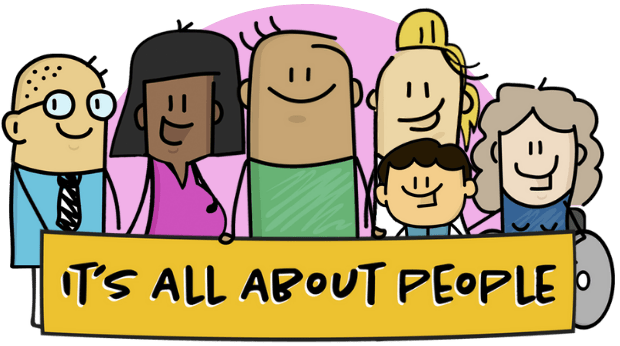Exploring personalisation with the nurses of tomorrow

A training day report by Alison Smith, Workforce Development Lead, It’s All About People Personalisation Programme
Feedback from the University of Lincoln about the training we provided to students:
"The It's All About People Personalisation Programme team provided a bespoke day of lectures to a cohort (approx 164 students) of 1st year student nurses.
"The knowledge about local initiatives and expertise in person-centred care, shared decision making, and its application to the practice setting has very much helped in raising awareness of these important elements in care and how the students may adapt their practice to support such goals.
"Whilst university lecturers can identify and explain underlying principles of what was taught, the It's All About People team's in-depth knowledge, and role in supporting practice across the county, added further credibility to the session."


On Monday 16 June, I had the absolute pleasure of spending the day with 120 first-year nursing students at the University of Lincoln. I was joined by my brilliant colleagues, Kirsteen and Gav, and together we delivered two training sessions as part of the students’ Personalisation module.
This was a fantastic opportunity to explore person-centred and strengths-based approaches with the students, and to highlight the progress and impacts of personalised care here in Lincolnshire, hopefully inspiring the students to continue their career in the county after graduation.
The sessions took place in one of the David Chiddick Building’s large lecture theatres. So, not the ‘workshop’ training setting that we usually create for the teams we work with - but that didn’t stop us from making the sessions as interactive and engaging as possible. Enter: Flinga – my new favourite digital tool! It allowed the students to take part in quizzes, share their thoughts, and answer questions throughout the day, all from their phones. It was brilliant to see so many thoughtful responses pop up on the screen.

What is Personalised Care...and Our Shared Agreement?
The training proper started by exploring ‘What is Personalisation’, before we introduced the students to Our Shared Agreement and the Five Foundations. We shared real-life stories that brought these powerful Foundations to life, showing how small changes in approach can make a huge difference in people’s lives.
To keep the students on their toes, we played Our Shared Agreement Bingo across the sessions. Every time the students spotted a Foundation had played a part in the delivery of care, or had transformed an outcome for a person – “Conversations with, not about people” for example – the students had to hold up the relevant Foundation card. It kept everyone listening and helped to bring the Foundations - and what they could be used to achieve - alive for the group.

One-Page Profiles
One of the highlights of the day was exploring One-Page Profiles. These are simple, powerful tools that help put the person at the heart of their own care. A One-Page Profile shares three key things about someone:
- What people like and appreciate about me
- What really matters to me
- The best ways to support me
These profiles might only take up a single sheet of paper, but they can be incredibly powerful. One student mentioned seeing blank One-Page Profile sheets above patients’ beds but that they weren’t being used.
So, we threw down a challenge: Next time you’re on placement, why not sit down with a patient and fill one out together?
The students then had a go at writing their own One-Page Profiles - and what they shared was moving, honest, and heartening. Here are just a few beautiful examples:
- What people appreciate about me: “Kindness, how I put everyone first, always try to make people smile, and I always encourage people to be the best version of themselves”
- What’s important to me: “Being comfortable, being talked to, and not being left out of decisions about me. Knowing what is happening.”
- How to support me: “Understand why I feel a certain way and let me talk about what is causing me issues. Being non-judgmental and just acknowledging what I’ve said.”

Which sheep are you today?
Following lunch, we got things rolling again with the tried and tested “Which sheep are you today?” activity (yes, we really do this!). Students picked the sheep that best matched their mood, and while quite a few were clearly feeling the heat (the lecture theatre was very warm) and chose Sleepy No.5, there were plenty of Bouncy No.9s too!


Shared Decision Making...and the language of care
We then dove into an exploration of Shared Decision Making, before finishing with a conversation about the language we use in care. This session sparked some of the most thought-provoking discussions of the day.
We asked the students to think about “Words that make you go hmmm…” - words like ‘vulnerable’ or ‘challenging’ that, although commonly used in health and care, can unintentionally label or dehumanise people.
To wrap up, we shared the Gloriously Ordinary Lives Test 2: Would I say this in my kitchen? With my family? At the pub with friends? It’s a simple yet powerful way to check if the language we use is respectful and person-centred, prompting us to use language that connects, rather than distances.

Final thoughts
All in all, the day was full of energy, empathy, and inspiration.
The students showed real curiosity, creativity, and compassion - and it left us feeling hopeful that the future of health and care is in good hands.
And best of all? We’ve been invited back! The programme’s senior lecturer confirmed he’d love us to be part of the nursing programme every year. We’re thrilled, and privileged, to continue this journey, ensuring the nurses of tomorrow understand the power of personalised and strengths-based approaches, and are ready to use and evolve these from the start of their careers and as they grow as professionals.







